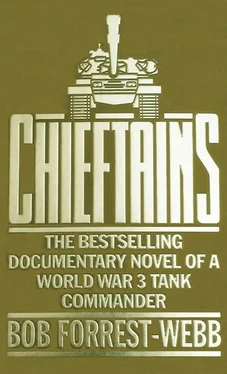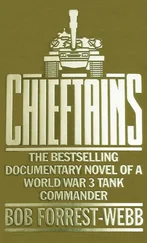‘Walk forward.’
Browning and his crew did so.
The boy had scrambled from behind the rubble and now ran past them. He spoke quickly to the soldiers. One, a lieutenant, walked over to Browning, keeping a rifle aimed at his chest. He said a few words whish Browning assumed to be Russian.
‘I’m sorry, I don’t understand you. We’re American… Black Horse Cavalry. Our tank’s out of action… the battle near the river, this afternoon.’
‘Be quiet.’ The lieutenant spoke to one of his soldiers. The man searched Browning, and then the others. ‘No… don’t move. Keep your hands up.’
The officer looked through the identification papers, then shrugged. ‘These don’t mean anything. There are plenty on the battlefield.’
Adams said: ‘Shit, man, you think I’m Russian?’
‘You could be Cuban, Angolan.’
‘Assholes… that’s worse than being called nigger.’
‘Steady Mike,’ warned Browning. If Adams lost his cool then everyone was likely to end up dead; and Adams was particularly sensitive about his nationality.
‘Who’s your commanding officer?’
‘Mickey Mouse,’ answered Podini. He was angry with the way the man had spoken to his friend.
‘You know we can’t tell you that,’ said Browning. ‘How the hell do we know you aren’t Russians?’
‘We got a stand-off situation,’ added Ginsborough. ‘Only we ain’t got guns.’
The boy spoke from behind them, excitedly.
The officer levelled his rifle at Browning’s forehead. ‘One of you still has a pistol… which one?’
‘None of us,’ answered Browning. He hoped he was right.
‘The boy says you all had one; he has found only three.’
‘I gave mine away.’
‘Lying is a good way to die.’
Browning spoke quickly. ‘It’s the truth. I gave mine to the woman who was with the boy. You can check.’
‘Why would you do that?’
‘I was sorry for her.’ It didn’t sound convincing.
The lieutenant spoke to the boy who turned and ran from the alley. ‘We will find out. Now move.’
They were led into the barn and then down a narrow flight of steps to a cellar. At the side of a stack of boxes was a narrow door partially concealed behind a concrete pillar. They were pushed inside. The room was lit by an oil lamp. Resting on benches along its length were more than a dozen infantrymen, Bundesgrenzshutz, their faces worn and tired, filthy with camouflage and the dirt of battle. Their weapons were across their knees or resting on the ground beneath the seats. Several looked up as Browning and his crew entered, but most ignored them. The lieutenant pointed to the far end of the room with the barrel of the rifle: ‘Go sit there.’
Browning and the crew did so.
‘What now?’ asked Adams.
‘What the hell what now? Why d’you always ask what now?’ grumbled Podini. ‘How the hell do I know what now?’
They waited for several minutes, and then one of the soldiers who had been outside in the alley came into the room and handed the German lieutenant Browning’s Remington. He said a few words to the officer, then left. The lieutenant examined the pistol, did out the magazine and worked the round from the breech. He examined the bullet slowly, turning the case in his fingers close to the light.
‘It’s a live one,’ said Browning. ‘You can test it.’
‘On your head,’ suggested Adams.
The lieutenant grinned sheepishly, and for the first time sounded friendly. ‘I believe you. No one but an American is going to be so stupid as to give his only weapon away. Chivalrous… but stupid Don’t forget, Sergeant, the Russians have been in Germany before; our women learnt how to survive. A pistol, for them, is the shortest route to the execution ground. And if you were a soldier of the Heer, such a generosity in wartime could get you shot. However… thank you for the gesture.’
‘So okay,’ said Adams. ‘Now what about my gas cutter?’
Browning explained about the XM1’s track, and how they had become isolated after the battle.
‘And what will you do if your tank is repaired?’ asked the lieutenant.
‘Get back to our unit, if we can. Try to find a place where the Russians are thinnest, and break through, rejoin the war.’
‘You have enough fuel?’
‘We’ve a three hundred mile range; we topped-up before the attack.’ Browning studied the German’s face. The man was very young, not much more than twenty-five years old. He looked like a student.
‘We will help you. We know the village. We can find the equipment you need.’
‘Once we get the Abrams repaired, maybe we can give you guys a lift someplace,’ suggested Browning.
The lieutenant grimaced, then shook his head. ‘We’re staying. The Russians will be back to consolidate the area, and we will be waiting for them.’
Lieutenant Colonel Studley had blacked out, fainted with the pain when one of the guards stamped on the wound in his calf, but it was the agony which dragged him back to consciousness, pulsing, searing, encompassing his entire body.
Studley heard himself scream, and the sound horrified him. There was still only darkness, and the sounds which came from his throat were uncontrollable, unreal, making him feel disembodied. Once, in childhood, he had broken an arm and been taken to hospital to have it set. He awakened on the operating table while the doctor was still manipulating the bone, and there had been the same combination of pain and sound… but then it had ended abruptly with the introduction of more anaesthetic, and became nothing more than a nightmare he remembered later. He tried now to find reality but for a long time it refused to appear, drowned by the spasms which shook his body and mind.
The bright glow was a small light above his head; faces blurred. He thought at first he must be in some medical centre where they were tending his wounds; his head throbbed violently. He found his arms were pinioned, pulled backwards so far his spine was arched away from the ground beneath him. His legs were spread wide.
There was a voice, persistent, questioning, It echoed inside his head, distorted, strident. He was being forced to concentrate on the words, the threats. He remembered.
‘You have no more chances. I warned you it would become unpleasant. You throwing your life away for no purpose.’
I am not here, thought Studley. He tried to blank the recent past from his mind. This is not reality; reality is Jane… brown eyes, long dark hair slipping between my fingers… her gentle body.
The agony returned, electrical, twisting at his bowels, jerking at strained and torn muscles, contorting his body and exploding like a thousand white-hot needles in his brain.
‘The code, Colonel Studley… only the code… the code… the code… only the code.’
The code? What code? There wasn’t any code… isn’t any code. The word doesn’t exist. Nothing I am experiencing exists in my real world; only Jane exists. Jane… dear God, Jane.
He felt her lips on his neck, and the round warmth of her breasts against his body. He could smell the scent of her hair. She was gripping him tightly, her thighs clasping him… he was losing her… the pain tearing her from his grasp.
‘The code, Studley… a few simple words…’ The agony and the shouting repeated a hundred times, gathering momentum until all his senses spun together in confusion.
The screams — they were no longer his own and he found he could ignore them. He could see her face again… the gentle mouth smiling, her eyes moist.
He realized his arms had been freed; it was part of the dream again. He refused to allow himself to be tricked. He was upright; body sagging, legs useless, his head lolled as if the neck muscles had been severed. Hands supported him, controlled him
Читать дальше












